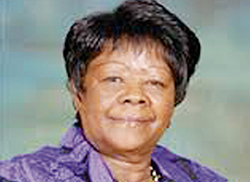Nyiva Mwendwa has her place in Kenyan history firmly cemented as the first woman cabinet minister. She served as the Minister for Culture and Social Services in the Moi government, a position she was appointed to after being elected to Parliament in the 1992 elections. She had made her debut in politics in the early 1970s, when women politicians were few and far between.
Winfred Nyiva Mwendwa is a veteran politician in her own right. She has dominated the politics in Kitui West constituency since 1974, when she made her grand debut by capturing the parliamentary seat. She was one of few women parliamentarians in the 1970s, alongside Julia Ojiambo, Eddah Gachukia, Jemima Gecaga and Chelagat Mutai.
The Alliance Girls’ High School alumnus made history in 1992, when President Daniel arap Moi appointed her to the cabinet. She was the first Kenyan female minister and headed the Ministry of Culture and Social Services. In 1995, she led a 450-strong Kenyan delegation to the Beijing Women’s conference.
Mwendwa served three terms in Parliament as the MP for Kitui West. She was first elected through the ruling party, Kenya African National Union (KANU), during a rough political period, and served until 1979. In 1985, her husband, Kitili Mwendwa, who was Kenya’s first indigenous chief justice, was killed in a road accident on the Nairobi-Thika road. He was the Kitui West MP at the time of his death.
Mwendwa was re-elected MP for Kitui West in the 1992 elections on a KANU ticket and served until 1997. Her next attempt at the seat was unsuccessful but never one to give up, she contested again in the 2002 elections and won on a National Rainbow Coalition party ticket. She served until 2007, when she lost her bid to defend the seat.
In 2013, she contested and won the Kitui County Woman Representative seat on a Wiper Democratic Movement party ticket.
Politics seems to run in the family. Her father-in-law, the late Mwendwa Kitavi, was a paramount chief whose sons went on to serve as top government officials. It is perhaps this connection that propelled her into the political arena.
Apart from her husband, her brother-in-law, Kyale Mwendwa, also served as the Kitui West MP at one time. And Ngala Mwendwa, another brother-in-law, was once a cabinet minister.
Mwendwa was not one to shy away from speaking openly about sensitive issues. For instance, in the early 1970s, she was among the first women to advocate for fair distribution of leadership jobs between men and women, arguing that the latter had the potential as well as the intellect required to handle such positions.
Many are the times she urged voters to elect female candidates while fearlessly speaking against corrupt male politicians, whom she said saw Parliament as their only hope because they could not find employment anywhere due to their bad governance records. She is on record for boldly asking the president to ensure that at least half of the 12 nominated MPs were female to ensure equality.
In 1979, while contributing to a debate in Parliament, the crusader for women’s welfare called for the release of all political detainees. She argued that the wives of political prisoners suffered the most because they were left to care for the children singlehandedly. In 1996, she vehemently opposed a proposal by some of her colleagues to form a women-led party. She termed it an act of cowardice and discrimination. But she reiterated her call to the government, this time asking for a reservation of at least 25 per cent of the parliamentary seats for women, citing Uganda, Malawi and South Africa as case studies.
Mwendwa has been an inspiration to disadvantaged women and widows in many ways, soldiering on with life in leadership and service even after the death of her husband. In an interview with The Standard newspaper, she urged widows not to lose hope, encouraging them to march on with determination and resolve, and complete any projects they may have begun with their husbands. “If you can, do even better,” she said in the interview.
Perhaps as a way of demonstrating what she meant, Mwendwa built a beautiful family home – explaining that she was fulfilling her husband’s wishes to build a house that was befitting their status in society. The magnificent structure was put up in just one year – between 1996 and 1997.
Although the mother of two adult children, Kavinya and Maluki, never remarried, she has voiced the opinion that widowed women should get married again if they so wish.
Mwendwa’s long career spanning decades as a pioneering woman politician ended when, in 2016, she announced that she would not be defending her seat as the Kitui woman representative in the 2017 General Elections, as she was retiring from active politics. She said it was time to allow younger and more energetic leaders to take over the mantle.
